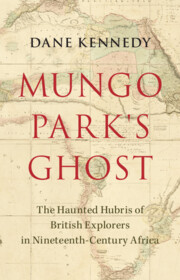Refine search
Actions for selected content:
3 results
Introduction
-
- Book:
- Mungo Park's Ghost
- Published online:
- 24 December 2023
- Print publication:
- 25 January 2024, pp 1-9
-
- Chapter
- Export citation
1 - In the Shadow of the Slave Trade
-
- Book:
- Mungo Park's Ghost
- Published online:
- 24 December 2023
- Print publication:
- 25 January 2024, pp 10-32
-
- Chapter
- Export citation

Mungo Park's Ghost
- The Haunted Hubris of British Explorers in Nineteenth-Century Africa
-
- Published online:
- 24 December 2023
- Print publication:
- 25 January 2024
